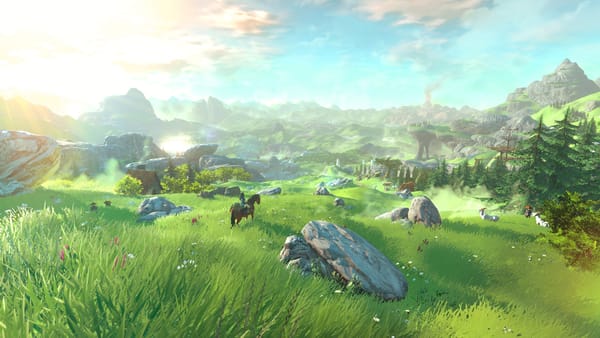#26: Talk to me, you'll understand
I’ve learned far more about games by talking to the people that make them than I ever have sat at home with a controller in my hands.
There are many things I do not miss from my time as a journalist — in hindsight I think it paid, if anything, too well — but lately I’ve found myself thinking wistfully about interviews. Many of my most treasured journo memories involved sitting across a table from someone smarter and more successful than me, somehow holding my own, then walking out with a good story, a greater understanding of a subject, and sometimes even a new friend (and the occasional enemy, it must be said). Interviewing is an undervalued, and underutilised, skill in our little corner of the media. There is a delicate balance to be struck — particularly at a show like E3, where you are just one of the dozens of members of the gaming press sitting down with a developer for your allotted 15 minutes.
You have to make sure you get the story you need, but ensure it is different enough to everyone else’s to stand out. You must establish enough of a rapport for the conversation to flow, but not spend so much time doing it that you run out of time to ask the important questions. You need to navigate your way past the subject’s often rigorous media training, nudging them off script and getting them to talk honestly — but in a way that puts them at ease, rather than on the defensive. You have to reassure them that you’re looking for a conversation, not hunting for a cheap headline. It’s a tightrope, really, one I have always enjoyed walking, and have got better at the more I’ve done it.
One of the many reasons I was disappointed with not-E3 last month was the general lack of interviews being published. This, I gather from my old pals in the media, was largely down to a lack of opportunity: publishers and platform holders were quite happy with their broadcasts and livestreams, and saw no point risking it all falling apart with a bad answer. But I’ve also heard from PR friends that the volume of interview requests from the press has been on the slide for a while now. This seems crazy to me, particularly given the year we’ve just had. With the events circuit shut down and the world’s communications moved almost entirely online, the developer community has been more theoretically accessible under Covid than it ever has been.
I expect this is as much about traffic as anything else — does the time spent arranging, conducting, transcribing and writing up an interview result in more clicks? I guess not — but it’s disappointing, and I hope it’s only temporary. Otherwise we’re left with the industry controlling the narrative, and the press either aggregating or critiquing it, ignoring the magic that can happen when the two meet in the middle to talk it over.
So, journalists, if you’re reading, ask for more interviews! Developers, publishers, marketeers and other industry folks: offer more of them up! I’ve learned far more about games by talking to the people that make them than I ever have sat at home with a controller in my hands. It’s made my work better and my job more enjoyable, and I know for a fact that developers can leave a good interview every bit as energised about their lot in life as I do. (There are other hidden benefits too. I remember someone getting in touch to thank me for an interview we did in Edge, saying: “I gave a copy to my mom, and she says she finally understands what I do for a living.”)
I get that the hours spent on interviews don’t always translate into traffic; I understand that one bad answer to a difficult question risks destroying months of careful planning. But I believe the work is important enough to justify a little risk. The discussion and discourse around games, miserable as they often are, cannot fail to benefit from two theoretically opposed sides sitting down and talking it all out. It turns out we have quite a lot in common, and there is much we can learn from each other.
MORE!
- First, a quick signal boost for a worthy cause. Readers in the game industry: a ten-year-old with a terminal illness needs your help.
- It’s nice to see more coverage of the Platform X stuff from last week, shining further light on Sony’s dismal treatment of indie developers. Of particular note is this report from Push Square, and its revelation that devs have no idea how a game launch has gone until their first invoicing report shows up 30 days later. Heavens above.
- More follow-up, too, on my story last week about consolidation: investments in game companies passed $60 billion in the first half of 2021. Of that, $23 billion was spent on mergers and acquisitions.
- NIS America is permanently raising the price of a number of titles on Steam later this month. This seems nuts but, in a world where you are never more than three minutes away from a digital sale of some kind, makes a certain sense. I wish them the best of luck with it.
- The ever-essential speedrun marathon Summer Games Done Quick kicked off yesterday. It’s live on Twitch; here’s the schedule, and the reddit VOD thread that I will have open in a browser tab for at least the next month. Speedrunning is brilliant, and GDQ is its greatest showcase.
- Sticking with that theme, this piece for The Atlantic, on how fraud is more aggressively policed by speedrunning communities than actual scientists, is excellent.
- Hackers, upset about Respawn ignoring the prevalence of hackers in Titanfall, have hacked Apex Legends in a bid to raise awareness and push the developer into action. Clever stuff, but I’m worried this ends with someone swallowing (or hacking?) a horse.
- The US department of justice is investigating the Overwatch League over suggestions its soft salary cap violates antitrust laws.
- I did not expect to start my week reading about what the withdrawal of US troops from Afghanistan means for the country’s Pokemon Go scene, but here we are. Features a spectacularly inappropriate Voltorb joke.
That’s it for today, as a great onion once said. As ever, if you’re enjoying Hit Points, please do the sharing thing using the button below, or by forwarding the email to a pal. We had a lovely spike in signups last week off the back of the Platform X story, and I’d like to see that continue. And remember, a paid subscription will run you as little as 14p a day — and in the not-too-distant future, will grant you access to some exclusive extra #content. Until next time!





